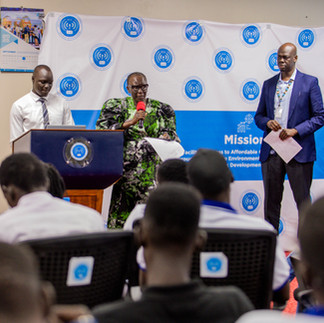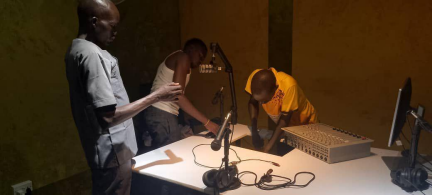Bridging Knowledge and Practice: University of Juba’s Student Visit to the National Communication Authority
- Tony kenyi
- Sep 16, 2025
- 2 min read

On 11 September 2025, the National Communication Authority (NCA) opened its doors to welcome 80 students and 10 lecturers from the School of Computer Science and Information Technology, University of Juba. The educational visit was a bridge between classroom learning and real-world practice, designed to inspire the next generation of ICT leaders in South Sudan.
The visit provided a unique opportunity for participants to engage directly with the NCA’s mandate, structure, and day-to-day functions. Students gained valuable insights into the regulatory backbone of South Sudan’s communications sector, with special emphasis on spectrum management, cybersecurity, digital inclusion, and the frameworks guiding ICT growth in the country.
Objectives of the Visit
The programme was structured to:
Introduce students to the mandate, structure, and functions of the NCA.
Provide practical learning experiences through guided tours and interactive sessions.
Highlight the NCA’s role in spectrum management, cybersecurity, digital inclusion, and regulatory oversight.
Inspire students to explore career opportunities in communications, technology, and ICT regulation.
DRF’s Role: Championing Digital Safety
As part of the programme, Digital Rights Frontlines (DRF) was represented by our IT Officer and SafetyComm Lead, Tony Kenyi, who facilitated a session on Digital Literacy and Cybersecurity. His presentation focused on three key areas:
Online Behaviour in South Sudan: Exploring how young people and professionals engage on digital platforms, the opportunities this creates for growth, and the risks associated with unsafe practices.
Cybersecurity Landscape in South Sudan: Providing an overview of emerging threats, current challenges, and why awareness and resilience are crucial in safeguarding digital spaces.
Digital Literacy and Safety: Emphasising responsible technology use, safe digital practices, and the importance of equipping youth with the skills to navigate an increasingly digital world.
Tony’s session was highly interactive, sparking discussions, questions, and experience-sharing from both students and lecturers. Many participants noted that the presentation not only added academic value but also provided real-world guidance they could immediately apply in their daily digital interactions.
Strengthening Partnerships and Building Capacity
The feedback from the event was reassuringly positive. Students and lecturers appreciated the opportunity to gain firsthand exposure to the NCA’s work, bridging the often wide gap between regulatory institutions and academia. Many expressed hope that similar initiatives will continue, building sustained partnerships that empower youth, strengthen academic institutions, and advance digital literacy in South Sudan.
Why This Matters
The success of this visit reaffirmed an essential truth: collaboration is key to building a digitally resilient South Sudan. By connecting regulators, universities, and civil society organisations, initiatives like this create pathways for young people to step confidently into roles as digital citizens, innovators, and ICT professionals.
As DRF, we remain committed to advancing cybersecurity awareness, digital literacy, and youth empowerment. Supporting initiatives like this visit ensures that students are not only equipped with technical knowledge but also guided to use technology safely, responsibly, and ethically.
This educational exchange is a small but powerful step towards nurturing a generation that will lead South Sudan into a safer, more inclusive digital future.


































Comments